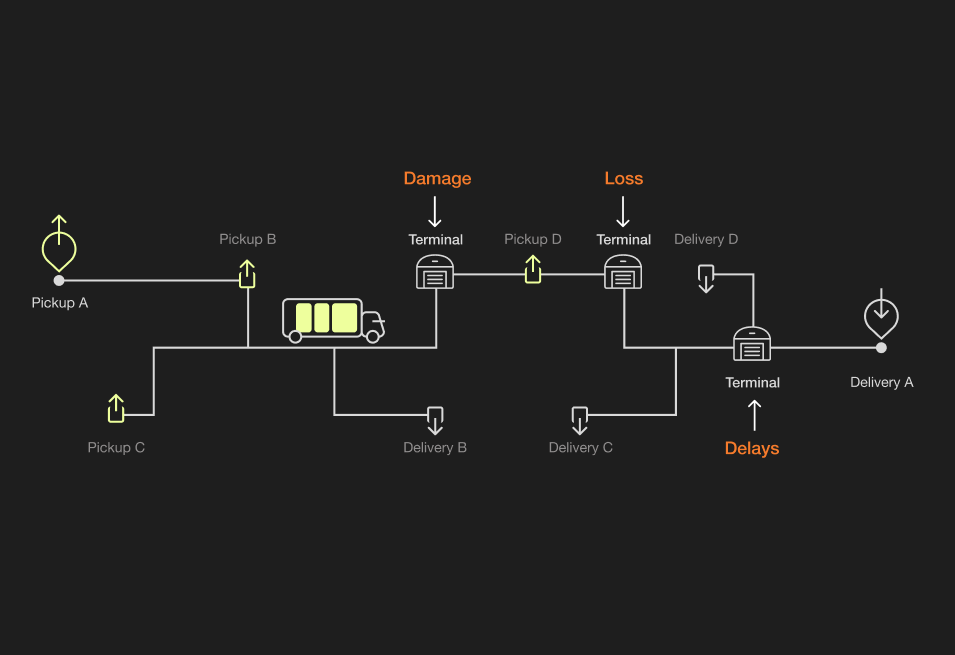Guide to Winter Weather Freight Shipping

Inclement weather conditions disrupt freight shipping and put stress on the economy. During these storms, shippers should plan on hazardous road conditions, delays at overwhelmed terminals, closures, reroutes, and other issues that make freight shipping in winter difficult.In this guide, we break down what to expect this winter for each U.S. region, plus how to safely deliver during winter storms—and how shipping shared truckload (STL) can make a difference.
How winter weather varies by region
The weather conditions and challenges they pose vary, often greatly, depending on what region you’re in. Here is a breakdown of the weather conditions for the three main U.S. regions.
Rocky Mountains and the West
Snow in this region can be unpredictable and intense. These snow storms often come fast and drop enough snow to block entire passes to the West coast. The Rocky Mountains are expected to see rapid, heavy snowfall this year leading to icy road conditions and blocked roadways, and extreme rainfall in the West has caused mudslides—taking out roads and temporarily closing others. Shippers should keep a close eye on weather conditions for this region, offer tracking and frequent updates to customers, and get temperature-controlled storage for items sensitive to cold in case carriers become stranded or stopped.
Northeast and Midwest
For this region, snow, sleet, ice, and hail can cause major disruptions with roads and even shut down entire cities and areas for days at a time. For vehicles to safely travel, roads must be plowed and salted–a task that can be difficult and time-consuming. Plan for icy road conditions with this year’s freezing temperatures and wetter-than-average conditions.Similar to the Rocky Mountains and the West, shippers should prepare their freight for cold temperatures to avoid unnecessary damage. Shippers should also consider waterproofing things like shipping labels.
Gulf, Atlantic, and Southeast
Hurricane season for this region typically is over by December, though often the increased precipitation can cause flooding, power outages, and road closures. This year, the region is experiencing an extreme drought and warmer-than-average temperatures. Droughts can disrupt ports and waterways, impact pavement performance, and potentially lead to wildfires, resulting in low visibility due to smoke. Shippers should take extra precautions to protect their freight from high temperatures. Add extra time to your shipping schedule to account for road closures and slower speeds due to poor pavement conditions and low visibility from smoke.
Tips for safe freight shipping in inclement weather
Despite inclement weather, your supply chain needs to keep moving. Since you can’t avoid freight shipping in winter, below are some tips for keeping your freight, and the drivers that carry it, safe.
Plan in advance
When it comes to planning ahead, there are three main areas to focus on:
- Weather Conditions
It’s important to understand the weather conditions of your region as well as the region you’re shipping to, and check frequently–weather can change rapidly in some areas. When you know the expected weather, you can confidently pad your shipping lead times to account for delays or reroutes.
2. Carrier Capacity/Available Inventory
You need to know shipping capacity. How many carriers and trucks are available? Knowing these things will help you not overpromise and underdeliver. Plan your inventory according to customer demand and weather conditions. If possible, spread your inventory out by region. Products that sell better in certain regions, especially in winter, should be closest to customers, minimizing shipping time or potential for delays.
3. Customer Experience
Communicate these delays and their causes to your customers as soon as possible. You can even warn of expected weather-related delays to your customers before they make a purchase. Have a dedicated member of your team available to manage customer communications and update customers on the status of your shipments and reasons for any delays.
Monitor markets
Keep an eye on the markets. Inclement weather can result in higher shipping rates. In areas experiencing extreme weather, you’ll find less carriers willing to take your freight, resulting in high rates for the ones that will. By monitoring the weather and understanding how it affects the rates, you’ll know where to book in advance to avoid rising rates.
Pick carriers who prep for winter weather
While it’s important for you to prepare for winter weather, it’s equally important for the carriers you work with to be prepared. Here are some questions to consider when choosing a carrier to work with:
- Has the carrier conducted any needed maintenance on their vehicles?
- Does the carrier have extra provisions like a blanket, food, water jugs, etc. packed?
- Has the carrier set up weather alerts?
- Has the carrier winterized their windshield?
Move STL instead of LTL
Though you can’t control the weather, you can control how you ship your freight. During inclement weather, LTL freight gets stuck in terminals where they can’t be monitored. You’re looking at potential damage, loss, and delays. With shared truckload (STL), shipments that are traveling on a similar route move on the same truck directly from the pickup location to the destination. By shipping shared truckload instead of LTL, you’ll:
- avoid hidden costs
- keep up with market and customer demands
- track shipments in real time
- avoid delays
- ship 99.8% damage-free
- ship terminal-free
Partner with Flock to winterproof your shipping logistics
Flock’s freight shipping platform uses patented technology to find and fill trucks’ empty spaces–moving your goods terminal-free with more accuracy, fewer emissions, and in a way that lessens the negative effects of this winter’s inclement weather. By partnering with Flock, you’ll be able to:
- access our network of 11,000+ trusted carriers
- cut costs by 20% compared to unfilled TL
- keep service levels up to your standards
- eliminate the hassles of hub and spoke
- scale your supply chain efficiently
- quickly book shipments, track your freight, and contact our support team
- get instant pickup and delivery notifications
Start shipping with Flock Freight today so you can withstand the winter weather and come out with a winterproof, efficient supply chain.





